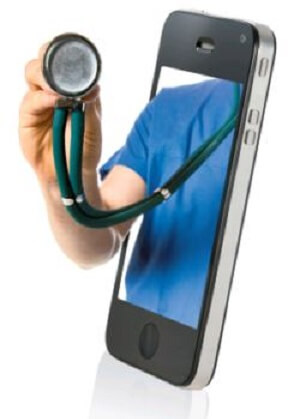Smartphone App Becomes a Medical Device
Driving forward the digital transformation of health and social care is the primary role of NHSX in the United Kingdom.
Simply put, it provides the technology that their staff and the public need to interact with the National Health Service.
A joint venture between NHSX and Healthy.io will offer half a million home-testing kits to patients over the coming years.
Note: Healthy.io is a health care company based in Israel that uses smartphone technology to offer a range of remote clinical testing and related services.
Benefits of Pioneering Artificial Intelligence
Recent advances made in artificial intelligence (AI) are starting to deliver some amazing results. Not least in the world of health and well-being and for sick patients with kidney disease.
So, how does the new technology benefit patients suffering with diabetes or hypertension (high blood pressure)?
In simple terms, the new smartphone app aims to revolutionise the early detection of kidney disease. It does so, by turning smartphone cameras into clinical-grade tools.
Here’s how it works:
Let’s assume you are one of the patients taking part in the programme. You would receive a simple test kit and gain access to the new digital application.
Thus, having this kind of smartphone technology means you would be able to test, scan, and then transmit your results to your local GP.
Can you imagine the benefits of being able to send your test results for early detection of kidney problems within minutes and without having to leave home to do so?
Important: Essentially, this new AI technology turns smartphone cameras into medical devices as it analyses, tests images, and produces results (no matter the quality of lighting conditions and camera type).
Chronic Kidney Disease in the UK
 Recent studies show chronic kidney disease affects close to one in ten people around the United Kingdom. Hence, the overriding objective for this testing app, and associated technology, is to reduce as many unnecessary visits to GPs and hospitals as possible.
Recent studies show chronic kidney disease affects close to one in ten people around the United Kingdom. Hence, the overriding objective for this testing app, and associated technology, is to reduce as many unnecessary visits to GPs and hospitals as possible.
Furthermore, encouraging more people to seek out early diagnosis through the use of smartphone technology is likely to save thousands of lives every year.
Here are some of the comments made by the Health and Social Care Secretary:
“This shows how innovative technologies can transform healthcare and improve lives. Patients can get a diagnosis much sooner.”
“Doing so saves time waiting for clinicians and they get to spend more time on the actual treatment.”
“By making this high-quality healthcare more accessible to patients, they also reduce the need to leave the comfort of their own home.”
Chief Executive of NHSX
The use of artificial intelligence carries invaluable potential for the NHS. In fact, it is already providing revolutionary benefits for patients as well as clinicians in many areas.
It means we can provide earlier diagnosis of deadly diseases, improve patient care, and enhance treatment outcomes.
For this reason, the AI in Health and Care Award programme is supporting the new technology along with 40+ other innovations.
The Accelerated Access Collaborative (in partnership with NHSX and the National Institute for Health Research) is managing the projects.
Self-Testing for Type 1 Diabetes
A Sussex Community NHS Foundation Trust project showed huge benefits in allowing people with type 1 diabetes to self-test at home.
In fact, testing rates rose from zero to 79%. As a result, around 20% produced results of ‘abnormal’ or ‘highly’ abnormal.
Furthermore, the diabetes clinical lead said they had been able to identify and focus on follow-up care. This was particularly important for people with early-stage chronic kidney disease. All things being equal, they may have gone undetected.
CKD Early Detection Service
People get a test kit, sent to them by mail, as part of the Healthy.io CKD Early Detection Service. Detection kits contain:
- Standard urine dipstick
- Urine collection pot
- Patented colour board
The smartphone application guides the user through the process needed to complete the CKD test. Simply put, the patient would need to use a standard smartphone camera to scan the dipstick on the colour board.
Next, the app uses AI and colourmetric analysis to read the results showing on the dipstick (e.g. same as a lab-based device).
At the same, the GP practice receives the same readout. This allows them to conduct a follow up if it produces an abnormal result.
Being able to offer at-home tests during the coronavirus pandemic is particularly beneficial to people at higher risk (e.g. those living with diabetes). Hence, the National Health Service (NHS) is able to offer patients an easy alternative instead of having to make a personal visit to a local clinic.
Related News and Archives
- Asthma inhaler colour codes used for patient safety.
- DWP starts using AI to catch benefit fraudsters.
- UK news articles about health and safety topics.
Note: The short video [5:23 seconds] explains more about early stage chronic kidney disease (CKD) and how making lifestyle changes can help manage the condition.

